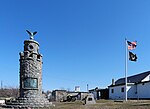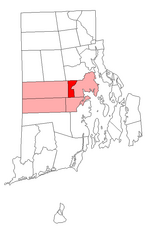Rhode Island ( (listen), like road) is a state in the New England region of the Northeastern United States. It is the smallest U.S. state by area and the seventh-least populous, with slightly less than 1.1 million residents as of 2020; but Rhode Island has grown at every decennial count since 1790 and is the second-most densely populated state, after New Jersey. The state takes its name from the eponymous island, though nearly all of its land area is on the mainland. Rhode Island borders Connecticut to its west; Massachusetts to its north and east; and the Atlantic Ocean to its south via Rhode Island Sound and Block Island Sound; and shares a small maritime border with New York, east of Long Island. Providence is its capital and most populous city.
Native Americans lived around Narragansett Bay for thousands of years before English settlers began arriving in the early 17th century. Rhode Island was unique among the Thirteen British Colonies in having been founded by a refugee, Roger Williams, who fled religious persecution in the Massachusetts Bay Colony to establish a haven for religious liberty. He founded Providence in 1636 on land purchased from local tribes, thereby creating the first settlement in North America with an explicitly secular government. The Colony of Rhode Island and Providence Plantations subsequently became a destination for religious and political dissenters and social outcasts, earning it the moniker "Rogue's Island".Rhode Island was the first colony to call for a Continental Congress, which it did in 1774, and the first to renounce its allegiance to the British Crown, which it did on May 4, 1776. After the American Revolution, during which it was heavily occupied and contested, Rhode Island became the fourth state to ratify the Articles of Confederation, which it did on February 9, 1778. Because its citizens favored a weaker central government, it boycotted the 1787 convention that had drafted the United States Constitution, which it initially refused to ratify; it finally did ratify it on May 29, 1790, the last of the original 13 states to do so.The state was officially named the State of Rhode Island and Providence Plantations since the colonial era, but came to be commonly known as "Rhode Island". In November 2020, the state's voters approved an amendment to the state constitution formally dropping "and Providence Plantations" from its full name. Its official nickname is the "Ocean State", a reference to its 400 mi (640 km) of coastline and the large bays and inlets that make up about 14% of its total area.









